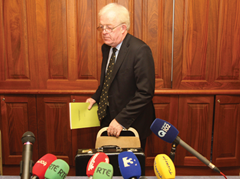Selling the state assets
 A review of the state’s assets and liabilities has concluded that approximately €5 billion worth of state-owned companies should be sold off.
A review of the state’s assets and liabilities has concluded that approximately €5 billion worth of state-owned companies should be sold off.
State-owned businesses such as ESB and RTÉ are already competing with private sector rivals therefore privatisation should be straight forward, the Report of the Review Group on State Assets and Liabilities has claimed.
“We are not suggesting that all of these companies could be put up on ebay tomorrow. It’s a process that takes six months or 12 months or longer,” said UCD economist Colm McCarthy, who chaired the three-man review group along with Trinity College economist Alan Matthews and Donal McNally, second secretary at the Department of Public Expenditure and Reform.
The report is not recommending a ‘fire sale’ of assets because the current economic situation could mean not getting value for money. McCarthy added that “the Government isn’t under any immediate financial pressure in the sense that the IMF- EU programme is in place, which means that the Government should be funded for the duration of that programme.”
Land-based assets should not be sold off, only the rights to “reap the produce of the land”. In addition, other intangible assets such as permits to emit CO2 and licences to use radio spectrum should be “sold to the highest bidder.”
Energy
Out of 55 recommendations, the group acknowledged that its proposal to sell ESB’s electricity distribution businesses, generation assets, international investment and consulting and engineering business as a single entity is the “most important”.
As ESB, Bord Gáis Éireann and Bord na Móna are competing energy companies in common ownership, they “lack coherence from the shareholder standpoint, and appear to involve internal cross- subsidisation between regulated and competitive businesses,” the report concluded.
The transmission grid should be transferred to EirGrid and retained in public ownership as a regulated monopoly, the group suggested. This would include the transfer of the high- voltage system in Northern Ireland, which ESB bought last year for €1.2 billion. This unbundling would increase competition and efficiency in the industry.
Energy Minister Pat Rabbitte told eolas: “I can see no merit in selling off state assets if we are not free to use the proceeds to stimulate growth and employment in the Irish economy. If it is merely for the purpose of writing down debt, I for one don’t see the merit of that.”
The group suggested that if ESB were not sold, all of its overseas interests should be disposed of and there should be no further expansion outside the island of Ireland “in order to assist in deleveraging the state balance sheet.”
In addition, no buyer should be allowed to bid for capacity which would bring its Irish market presence above approximately 2,000MW.
Hydro-electricity is “the main source of fast-acting primary spinning reserve on the national power system” and has always provided stability to the power system, therefore the group recommended that all hydro units be transferred to EirGrid and be operated by them as regulated assets.
The group believes that the current target for renewable energy penetration (40 per cent by 2020) should be “revised downwards” because existing capacity won’t be able to reach that.
In relation to Bord Gáis, the report recommends that its regulated transmission and interconnector assets be retained in state ownership. Merging those assets with EirGrid should also be considered.
Bord na Móna, which is involved in peat production, power generation and waste collection, should be disposed of as a single entity, including peat extraction rights but not ownership of the peat lands, the report adds.
In addition to the energy measures, the report recommends that:
• all state companies, except Dublin Airport Authority (DAA) should pay a 30 per cent share of their profits to the exchequer;
• Coillte’s assets (apart from forest land) should be sold, Bord na gCon should sell its greyhound tracks and betting operations and the National Stud should be sold; and
• the various state regulators should be placed under the authority of the Department of Enterprise, Trade and Innovation and the shareholder function of all state companies should be centralised within the Department of Finance.
Rates of pay across the state sector were revealed. They include: €94,300 at ESB, €96,000 at EirGrid, €110,000 at Dublin Port and €120,000 at the Irish Aviation Authority.
In light of this, the report recommends that the pay and conditions in all state companies should be reviewed and compared with peers in other European countries to ensure that costs are competitive. In response, the Minister for Public Expenditure and Reform Brendan Howlin said people would be “surprised and shocked” at the salaries.
The Government will now review pay rates across the public sector and Howlin said he would not put McCarthy’s findings on rates of pay “on the long finger”.
He said he would put each of the 55 recommendations to the relevant departments and take decisions as soon as possible on their implementation.
“As set out in the Programme for Government, non-strategic assets up to a value of €2 billion will only be sold when market conditions are right and when adequate regulatory structures have been established to protect consumer interests,” Howlin said.





